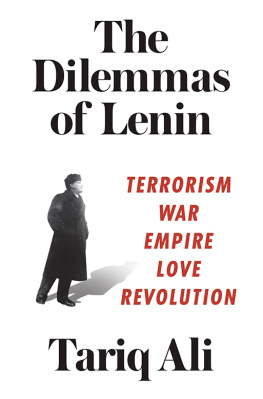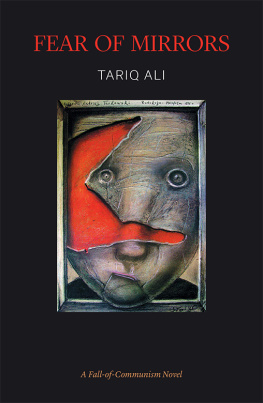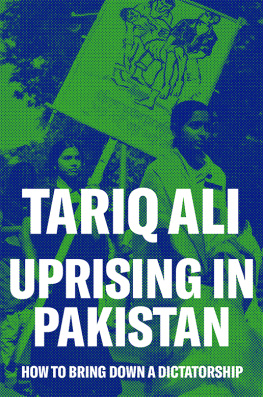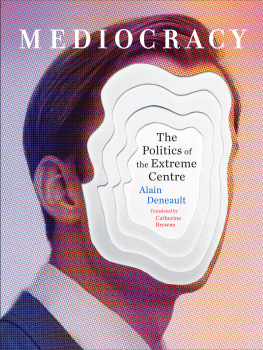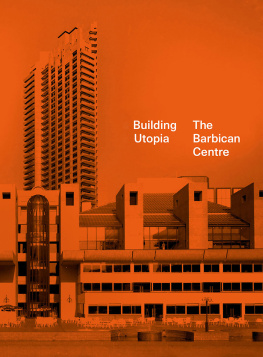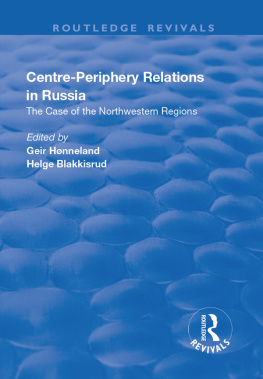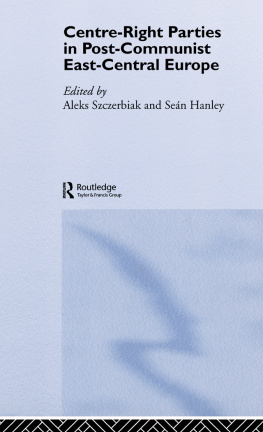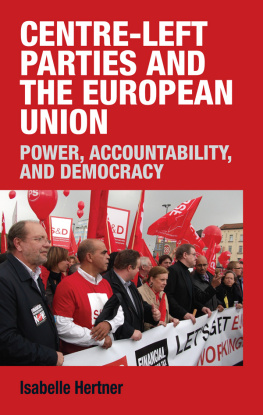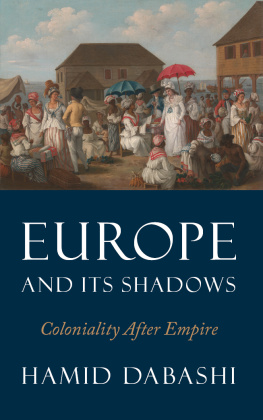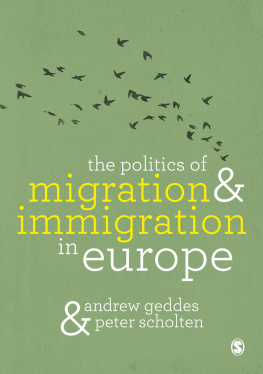TARIQ ALI is a writer and filmmaker. He has written more than a dozen books on world history and politics including The Clash of Fundamentalisms, The Obama Syndrome, The Dilemmas of Lenin, and the novels of the Islam Quintet as well as scripts for the stage and screen. He is an editor of New Left Review and lives in London.
The Extreme
Centre
A Second Warning
New and Updated Edition
Tariq Ali

This new and updated edition first published by Verso 2018
First published by Verso 2015
Tariq Ali 2015, 2018
All rights reserved
The moral rights of the author have been asserted
1 3 5 7 9 10 8 6 4 2
Verso
UK: 6 Meard Street, London W1F 0EG
US: 20 Jay Street, Suite 1010, Brooklyn, NY 11201
versobooks.com
Verso is the imprint of New Left Books
ISBN-13: 978-1-78663-706-2
ISBN-13: 978-1-78478-263-4 (US EBK)
ISBN-13: 978-1-78478-268-9 (UK EBK)
British Library Cataloguing in Publication Data
A catalogue record for this book is available from the British Library
The Library of Congress Has Cataloged the First Edition as Follows:
Ali, Tariq.
The extreme centre : a warning / Tariq Ali.
pages cm
Includes bibliographical references and index.
ISBN 978-1-78478-262-7 (paperback : alkaline
paper)
1. World politics1989 2. World politics
Forecasting. 3. Center partiesWestern countries.
4. DemocracyWestern countries. 5. Political
cultureWestern countries. 6. CapitalismPolitical
aspectsWestern countries. 7. Populism.
8. Revolutions. 9. Great BritainPolitics and
government2007 10. Western countriesPolitics
and government. I. Title. II. Title: Extreme center.
D2009.A43 2015
320.91821dc23
2014048362
Typeset in Fournier by MJ & N Gavan, Truro, Cornwall
Printed in the UK by CPI Group UK (Ltd), Croydon, GR0 4YY
In Memoriam:
Hugo Chvez, the first leader of a movement
that defeated the extreme centre
Contents
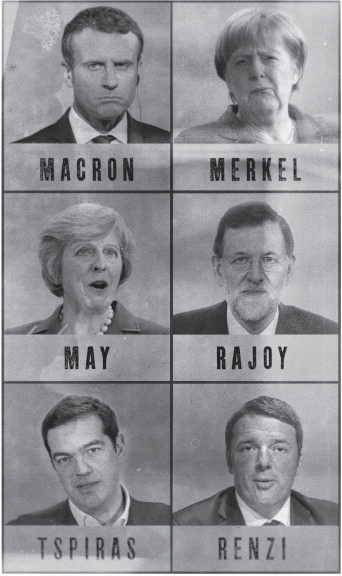
We continue to live in a chaotic and confusing world. But its problems dont change they just take new forms.
The political balance sheet since the first edition of The Extreme Centre was published in 2015 is mixed. The popular movements against extreme-centre policies were defeated in Greece by Syriza, the party once expected to be their champion. They were stalemated in Spain as the conservative Peoples Party held on to power but with Podemos slowly moving upwards while the Socialist Party divided. There is confusion in Italy as the Five-Star Movement drifts inexorably to the right. In the UK Corbyn came very close to a triumph in Britain, hampered by his parliamentarians, who are still very much part of the extreme centre.
There are glimmers of hope. The only EU state that has progressed beyond austerity is Portugal, where a left camp defeated the extreme centre and challenged the measures imposed by the EU. A fall in unemployment and a rise in GDP was the result. The governing Socialist Party (a third way, Blairite outfit) was pushed by a growing opposition to propose a coalition with the Left Bloc and the Communist Party. Both groups agreed to swallow the bitter pill, but refused to join the government, leaving themselves free to vote against it, or even to bring it down, if it reneges on its promise to oppose austerity.
In a lengthy interview with New Left Review, Catarina Martins, the leader of the Bloc, explained:
So if we are in this position of occupying a terrain that, strictly speaking, is wider than the traditional space of the radical left, having to learn and create a movement at a time when successful revolutionary forces do not exist, we should always be clear when we speak to people. We cannot say to the unemployed that perhaps one day the European institutions will change. We need to tell them what we can do in our own countries to change that situation if we dont, then the far right will do it, even if they are offering the wrong solutions.
We should not let defenders of the status quo tell us that it is the European Union that is responsible for the longest period of peace and development in Europe, because that is simply nonsense. It was public investment, the welfare state, and control over strategic sectors of the economy that made peace and development possible, not the EU We should not waste our time trying to make the EU a little better; we should concentrate on proposals that are practical and comprehensible, combining public control of banks and other strategic sectors with changes in labour law that advance workers rights, and state clearly that such proposals are incompatible with the European treaties.
The honesty and courage evident here reminds me of a story from the ancient world. In Sparta, in the third century BCE, a fissure had opened up between the ruling elite and ordinary people in the two centuries following the states victory in the Peloponnesian War. Those who were ruled demanded change because the gap between rich and poor had become too large to tolerate. A succession of radical monarchs, Agis IV, Cleomenes III and Nabis, created a structure to help revive the state. Nobles were sent into exile. Debts were forgiven. Slaves were granted their freedom and the franchise. And land confiscated from the rich was distributed to the poor (something the European Central Bank wouldnt tolerate today).
The early Roman Republic, threatened by this example, sent its legions under Titus Quinctius Flamininus to crush Sparta. Livy, in his Histories, gives an account of the response from Nabis, the king of Sparta. One can still feel the cold anger and the dignity, so lacking in todays politicians:
Do not demand that Sparta conform to your own laws and institutions You select your cavalry and infantry by their property qualifications and desire that a few should excel in wealth and the common people be subject to them. Our lawgiver did not want the state to be in the hands of a few, whom you call the Senate, nor that any one class should have supremacy in the state. He believed that by equality of fortune and dignity there would be many to bear arms for their country.
I have added four new chapters to this second edition of a book I intend as a warning. The further progress of the extreme centre is now explored by examinations of Macrons victory in France, the continued preponderance of Merkel in Germany, and rise of Donald Trump as the forty-fifth president of the United States. Some hope is found in the continued success of Jeremy Corbyn, offering some indication of an alternative in Brexit Britain. The conversations with Wolfgang Streeck, Olivier Tonneau and Andrew Murray included in the German, French and UK chapters should not be taken to indicate that any one of them shares the point of view expressed in the book. That is my responsibility alone.
Tariq Ali
1 September 2017
Democracy is in serious trouble, especially in its European heartlands. In the United States the citizens have, more or less, accepted a broken system for over a century. A sizeable percentage of the electorate has accustomed itself to not voting, a form of passive protest and a recognition that the system is pretty much corrupt.path, with this exception: whereas US politics is petrified, in a number of European countries challenges to the existing structures are emerging.



